 M URRAY-
M URRAY-
D A R L I N G
Australian Government
B A S I N
A U T H O R I T Y
TRIM Ref: D17/24535
MDBA Ref: FOI 76
17 July 2017
Name withheld
By Email: foi+request-3639-6af3c41
x@xxxxxxxxxxx.xxx.xx
Dear Sir/Madam,
Request for documents under the Freedom of Information Act 1982 (Cth)
1. I refer to your
Freedom of Information Act 1982 (Cth) request of 16 June 2017 to the
Murray-Darling Basin Authority (MDBA), which was received by MDBA on 16 June 2017
and in which you sought access to:
‘Documents which detail the precise monies paid to each of the Murray Darling
Basin Authority's (MDB's) SES officers in the following financial years -
FY2013/14, FY 2014/15 and FY2015/16. The group certificates/end-of-year
PAYG payments summaries issued by the MDB to each of its SES staff in those
years can be quickly and easily identified and retrieved, and will efficiently and
accurately provide the information the subject of my request.’
Authority
2. I am, pursuant to arrangements authorised by the Chief Executive of the Murray-Darling
Basin Authority (MDBA) under section 23 of the FOI Act, authorised to make a decision
in relation to this request on behalf of the MDBA.
Decision
3. In respect of the documents I have identified and located that are within the scope of
your request, I have made a decision that I will refuse access to all documents in
accordance with s 47F (Personal Privacy) of the FOI Act.
4. I also advise that I have decided to waive charges applicable to processing your request.
GPO Box 1801 Canberra ACT 2601
Telephone: 02 6279 0100
Facsimile: 02 6248 8053
Email:
xxxxxxxxx@xxxx.xxx.xx
Web:
www.mdba.gov.au
ABN 13679821382
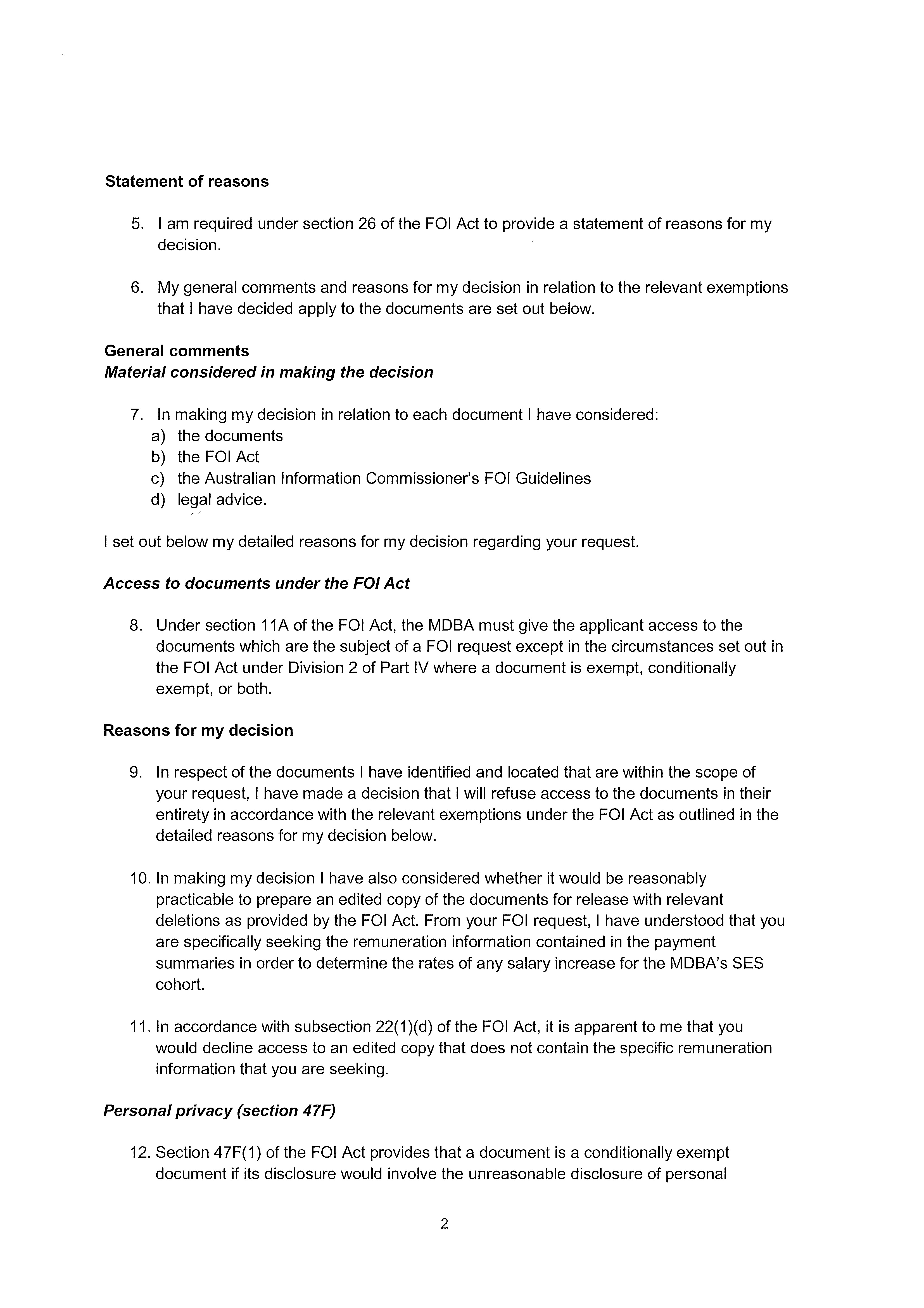 Statement of reasons
Statement of reasons
5. I am required under section 26 of the FOI Act to provide a statement of reasons for my
decision.
6. My general comments and reasons for my decision in relation to the relevant exemptions
that I have decided apply to the documents are set out below.
General comments
Material considered in making the decision
7. In making my decision in relation to each document I have considered:
a) the documents
b) the FOI Act
c) the Australian Information Commissioner’s FOI Guidelines
d) legal advice.
I set out below my detailed reasons for my decision regarding your request.
Access to documents under the FOI Act
8. Under section 11A of the FOI Act, the MDBA must give the applicant access to the
documents which are the subject of a FOI request except in the circumstances set out in
the FOI Act under Division 2 of Part IV where a document is exempt, conditionally
exempt, or both.
Reasons for my decision
9. In respect of the documents I have identified and located that are within the scope of
your request, I have made a decision that I will refuse access to the documents in their
entirety in accordance with the relevant exemptions under the FOI Act as outlined in the
detailed reasons for my decision below.
10. In making my decision I have also considered whether it would be reasonably
practicable to prepare an edited copy of the documents for release with relevant
deletions as provided by the FOI Act. From your FOI request, I have understood that you
are specifically seeking the remuneration information contained in the payment
summaries in order to determine the rates of any salary increase for the MDBA’s SES
cohort.
11. In accordance with subsection 22(1 )(d) of the FOI Act, it is apparent to me that you
would decline access to an edited copy that does not contain the specific remuneration
information that you are seeking.
Personal privacy (section 47F)
12. Section 47F(1) of the FOI Act provides that a document is a conditionally exempt
document if its disclosure would involve the unreasonable disclosure of personal
2
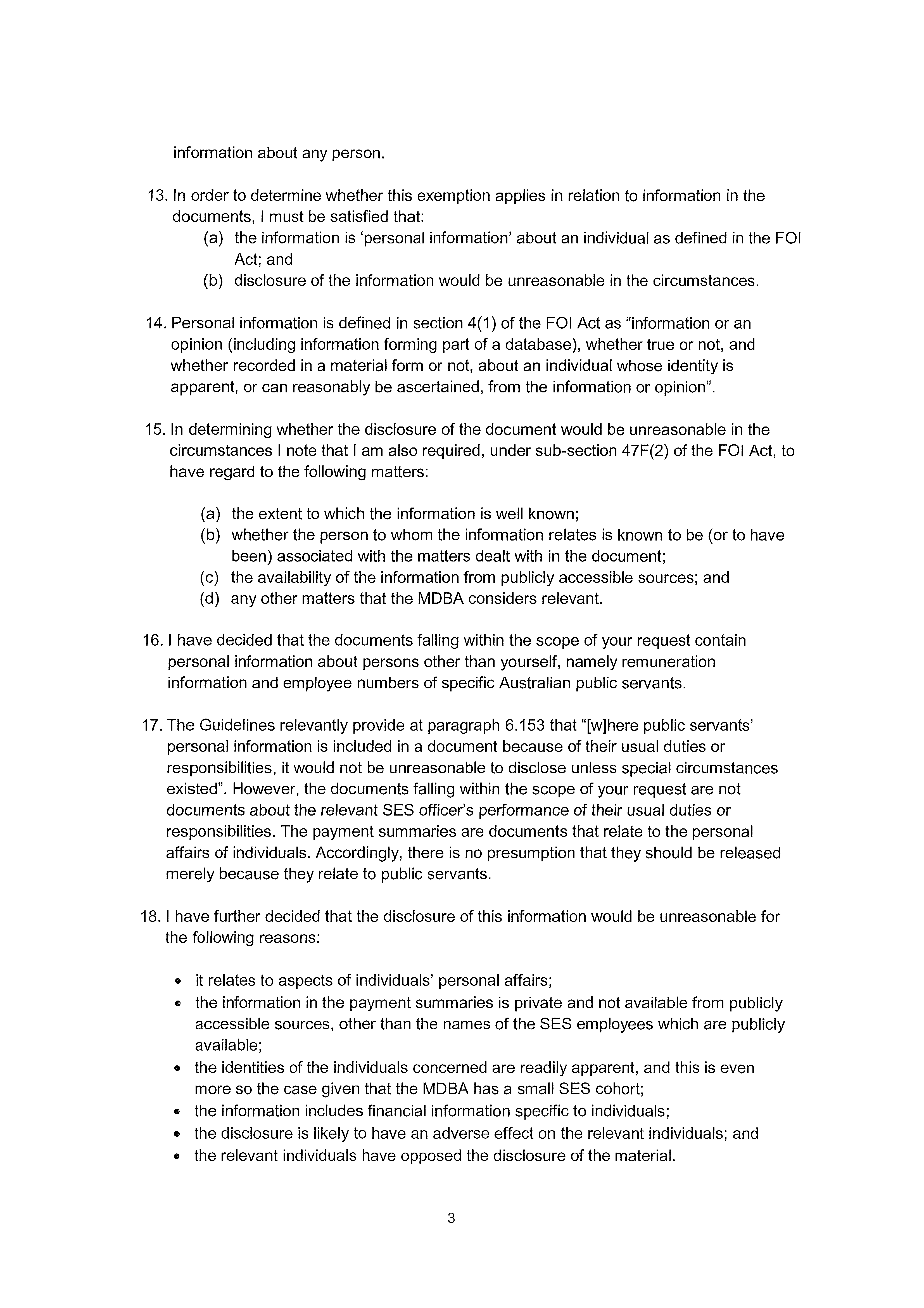
information about any person.
13. In order to determine whether this exemption applies in relation to information in the
documents, I must be satisfied that:
(a) the information is ‘personal information’ about an individual as defined in the FOI
Act; and
(b) disclosure of the information would be unreasonable in the circumstances.
14. Personal information is defined in section 4(1) of the FOI Act as “information or an
opinion (including information forming part of a database), whether true or not, and
whether recorded in a material form or not, about an individual whose identity is
apparent, or can reasonably be ascertained, from the information or opinion”.
15. In determining whether the disclosure of the document would be unreasonable in the
circumstances I note that I am also required, under sub-section 47F(2) of the FOI Act, to
have regard to the following matters:
(a) the extent to which the information is well known;
(b) whether the person to whom the information relates is known to be (or to have
been) associated with the matters dealt with in the document;
(c) the availability of the information from publicly accessible sources; and
(d) any other matters that the MDBA considers relevant.
1 6 .1 have decided that the documents falling within the scope of your request contain
personal information about persons other than yourself, namely remuneration
information and employee numbers of specific Australian public servants.
17. The Guidelines relevantly provide at paragraph 6.153 that “[w]here public servants’
personal information is included in a document because of their usual duties or
responsibilities, it would not be unreasonable to disclose unless special circumstances
existed”. Flowever, the documents falling within the scope of your request are not
documents about the relevant SES officer’s performance
of their usual duties or
responsibilities. The payment summaries are documents that relate to the personal
affairs of individuals. Accordingly, there is no presumption that they should be released
merely because they relate to public servants.
1 8 .1 have further decided that the disclosure of this information would be unreasonable for
the following reasons:
• it relates to aspects of individuals’ personal affairs;
• the information in the payment summaries is private and not available from publicly
accessible sources, other than the names of the SES employees which are publicly
available;
• the identities of the individuals concerned are readily apparent, and this is even
more so the case given that the MDBA has a small SES cohort;
• the information includes financial information specific to individuals;
• the disclosure is likely to have an adverse effect on the relevant individuals; and
• the relevant individuals have opposed the disclosure of the material.
3
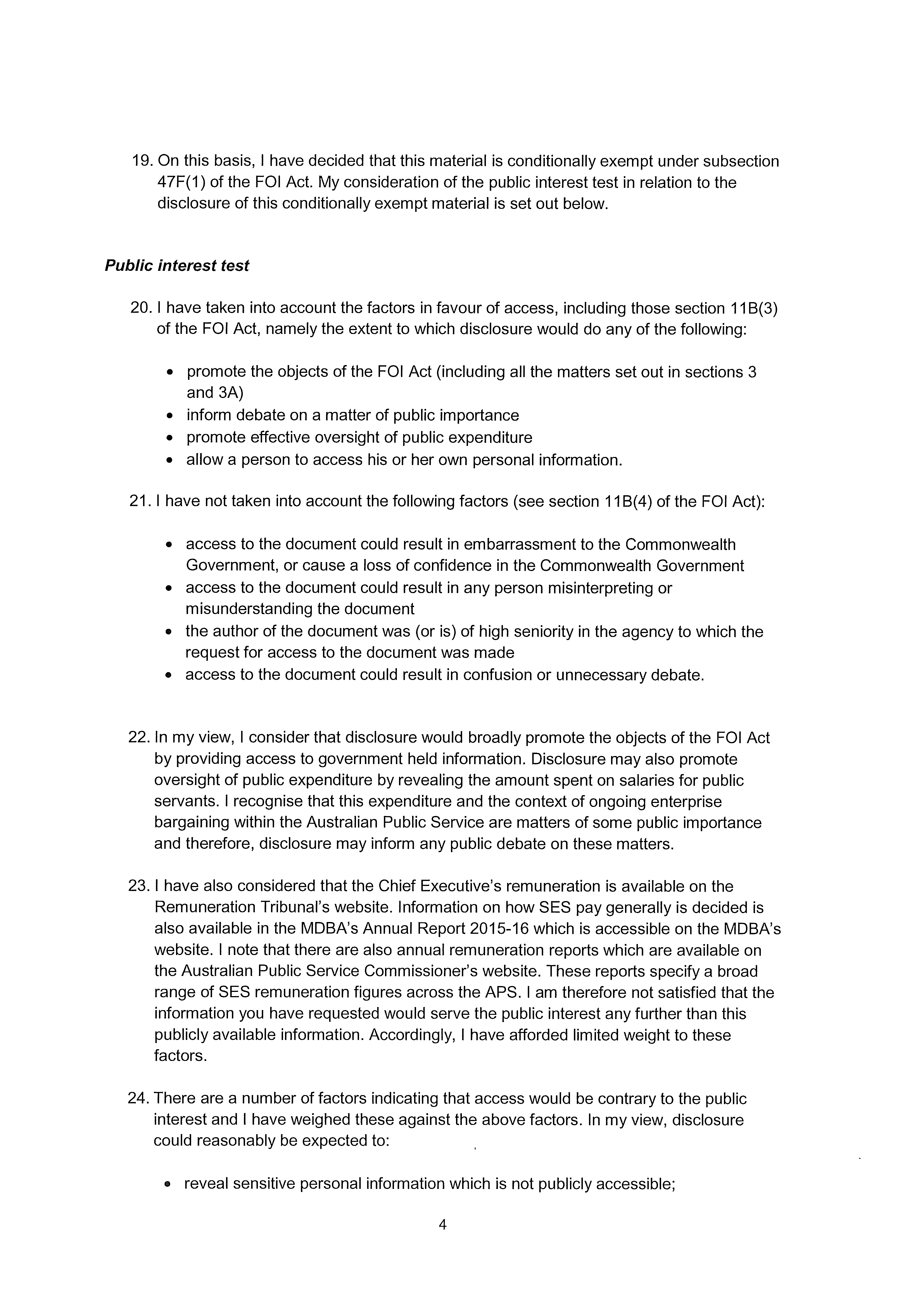
19. On this basis, I have decided that this material is conditionally exempt under subsection
47F(1) of the FOI Act. My consideration of the public interest test in relation to the
disclosure of this conditionally exempt material is set out below.
Public interest test
2 0 .1 have taken into account the factors in favour of access, including those section 11 B(3)
of the FOI Act, namely the extent to which disclosure would do any of the following:
• promote the objects of the FOI Act (including all the matters set out in sections 3
and 3A)
• inform debate on a matter of public importance
• promote effective oversight of public expenditure
• allow a person to access his or her own personal information.
21.1 have not taken into account the following factors (see section 11 B(4) of the FOI Act):
• access to the document could result in embarrassment to the Commonwealth
Government, or cause a loss of confidence in the Commonwealth Government
• access to the document could result in any person misinterpreting or
misunderstanding the document
• the author of the document was (or is) of high seniority in the agency to which the
request for access to the document was made
• access to the document could result in confusion or unnecessary debate.
22. In my view, I consider that disclosure would broadly promote the objects of the FOI Act
by providing access to government held information. Disclosure may also promote
oversight of public expenditure by revealing the amount spent on salaries for public
servants. I recognise that this expenditure and the context of ongoing enterprise
bargaining within the Australian Public Service are matters of some public importance
and therefore, disclosure may inform any public debate on these matters.
2 3 .1 have also considered that the Chief Executive’s remuneration is available on the
Remuneration Tribunal’s website. Information on how SES pay generally is decided is
also available in the MDBA’s Annual Report 2015-16 which is accessible on the MDBA’s
website. I note that there are also annual remuneration reports which are available on
the Australian Public Service Commissioner’s website. These reports specify a broad
range of SES remuneration figures across the APS. I am therefore not satisfied that the
information you have requested would serve the public interest any further than this
publicly available information. Accordingly, I have afforded limited weight to these
factors.
24. There are a number of factors indicating that access would be contrary to the public
interest and I have weighed these against the above factors. In my view, disclosure
could reasonably be expected to:
• reveal sensitive personal information which is not publicly accessible;
4
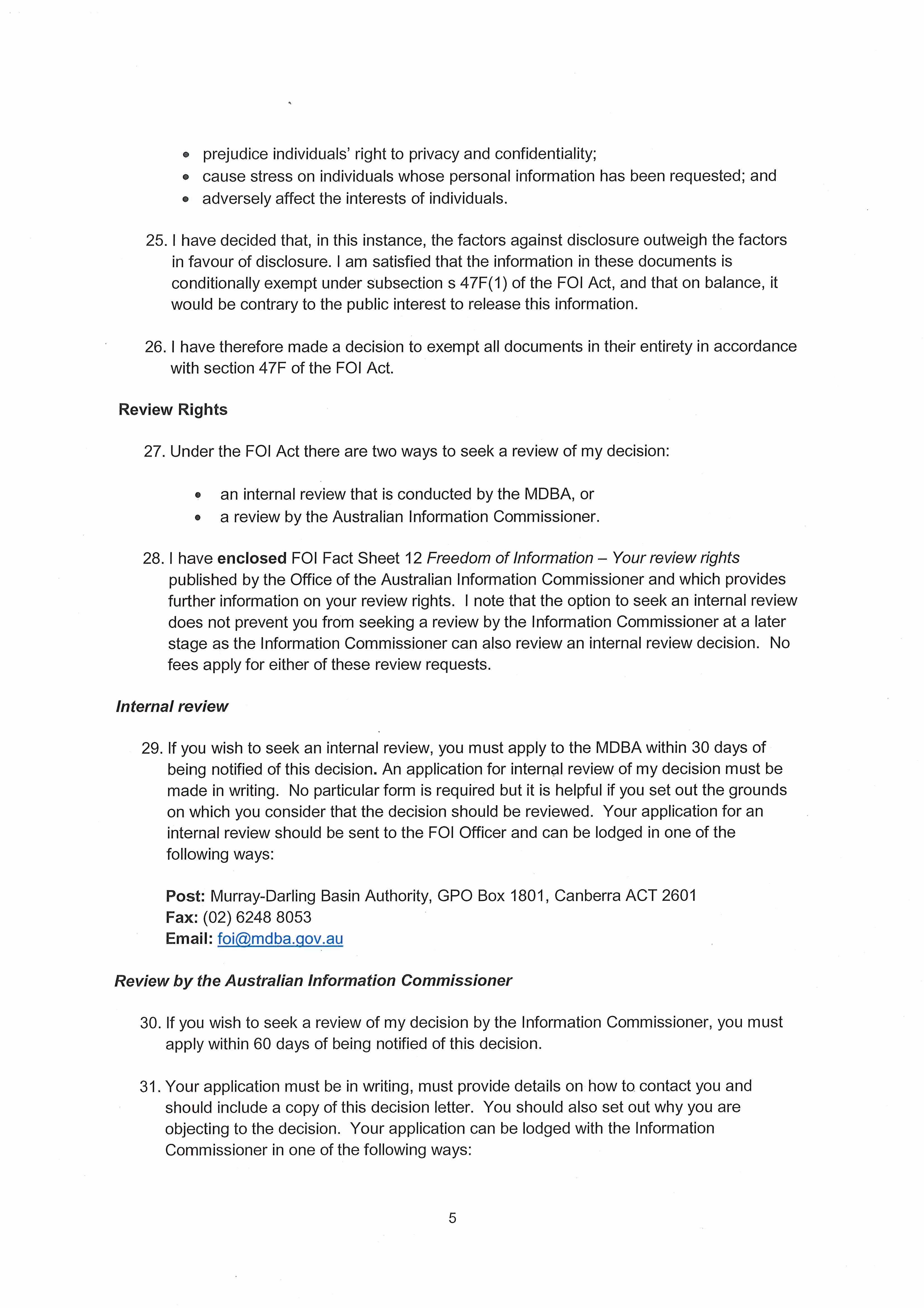
© prejudice individuals’ right to privacy and confidentiality;
© cause stress on individuals whose personal information has been requested; and
© adversely affect the interests of individuals.
25. I have decided that, in this instance, the factors against disclosure outweigh the factors
in favour of disclosure. I am satisfied that the information in these documents is
conditionally exempt under subsection s 47F(1) of the FOI Act, and that on balance, it
would be contrary to the public interest to release this information.
2 6 .1 have therefore made a decision to exempt all documents in their entirety in accordance
with section 47F of the FOI Act.
Review Rights
27. Under the FOI Act there are two ways to seek a review of my decision:
•
an internal review that is conducted by the MDBA, or
•
a review by the Australian Information Commissioner.
2 8 .1 have
enclosed FOI Fact Sheet 12
Freedom of Information - Your review rights
published by the Office of the Australian Information Commissioner and which provides
further information on your review rights. I note that the option to seek an internal review
does not prevent you from seeking a review by the Information Commissioner at a later
stage as the Information Commissioner can also review an internal review decision. No
fees apply for either of these review requests.
Internal review
29. If you wish to seek an internal review, you must apply to the MDBA within 30 days of
being notified of this decision. An application for internal review of my decision must be
made in writing. No particular form is required but it is helpful if you set out the grounds
on which you consider that the decision should be reviewed. Your application for an
internal review should be sent to the FOI Officer and can be lodged in one of the
following ways:
Post: Murray-Darling Basin Authority, GPO Box 1801, Canberra ACT 2601
Fax: (02) 6248 8053
Email: xxx@xxxx.xxx.xx
Review by the Australian Information Commissioner
30. If you wish to seek a review of my decision by the Information Commissioner, you must
apply within 60 days of being notified of this decision.
31. Your application must be in writing, must provide details on how to contact you and
should include a copy of this decision letter. You should also set out why you are
objecting to the decision. Your application can be lodged with the Information
Commissioner in one of the following ways:
5
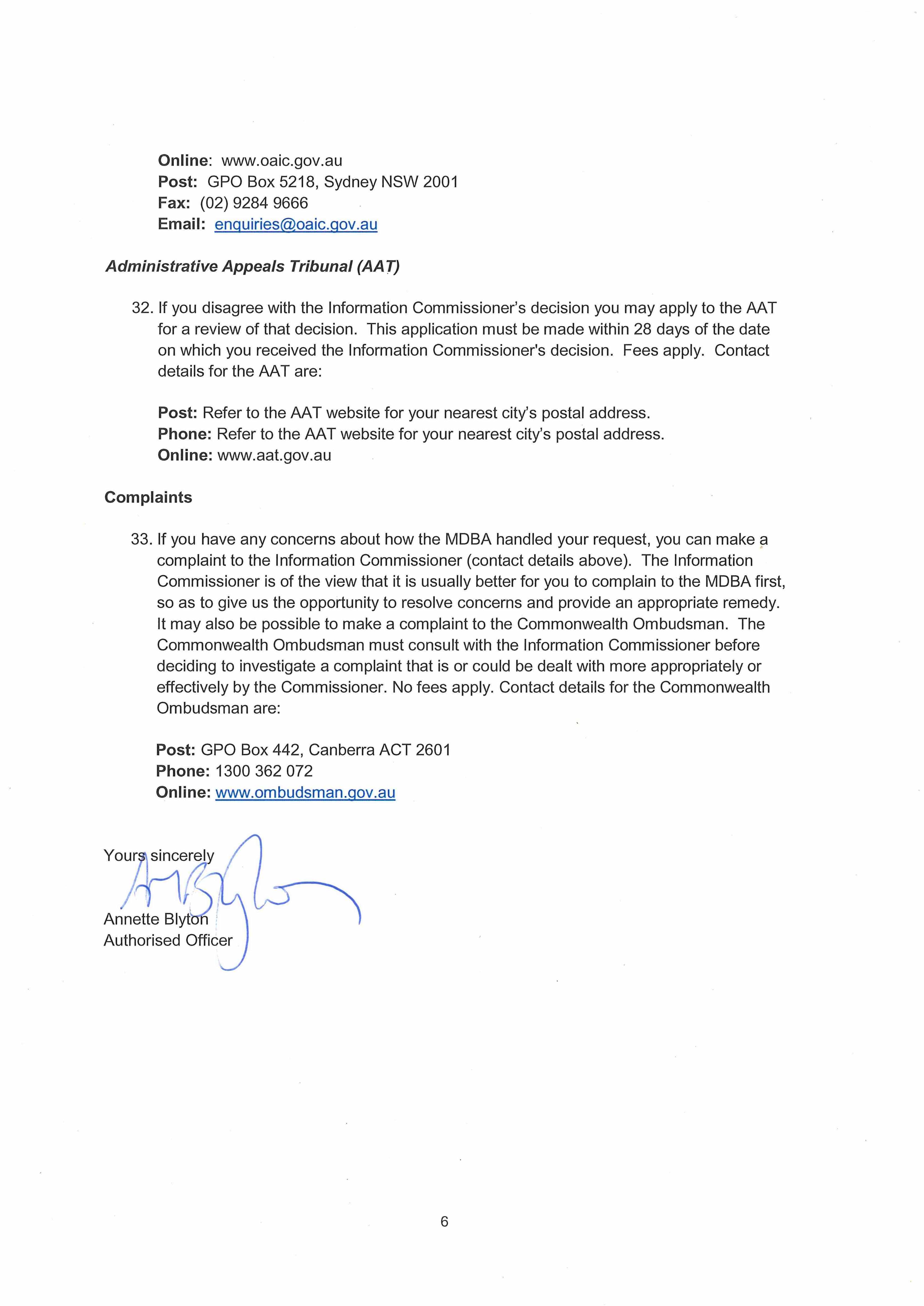 Online: www.oaic.gov.au
Online: www.oaic.gov.au
Post: GPO Box 5218, Sydney NSW 2001
Fax: (02)9284 9666
Email: xxxxxxxxx@xxxx.xxx.xx
Administrative Appeals Tribunal (AAT)
32. If you disagree with the Information Commissioner’s decision you may apply to the AAT
for a review of that decision. This application must be made within 28 days of the date
on which you received the Information Commissioner's decision. Fees apply. Contact
details for the AAT are:
Post: Refer to the AAT website for your nearest city’s postal address.
Phone: Refer to the AAT website for your nearest city’s postal address.
Online: www.aat.gov.au
Complaints
33. If you have any concerns about how the MDBA handled your request, you can make a
complaint to the Information Commissioner (contact details above). The Information
Commissioner is of the view that it is usually better for you to complain to the MDBA first,
so as to give us the opportunity to resolve concerns and provide an appropriate remedy.
It may also be possible to make a complaint to the Commonwealth Ombudsman. The
Commonwealth Ombudsman must consult with the Information Commissioner before
deciding to investigate a complaint that is or could be dealt with more appropriately or
effectively by the Commissioner. No fees apply. Contact details for the Commonwealth
Ombudsman are:
Post: GPO Box 442, Canberra ACT 2601
Phone: 1300 362 072
Online: www.ombudsman.qov.au
6





